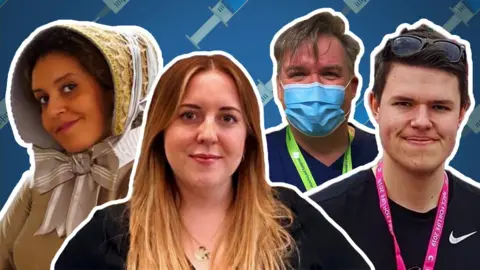Vaccine volunteers: 'It's felt good to fight back against Covid'
 BBC
BBCMore than five million people in the UK have now received the first dose of a coronavirus vaccine - thanks to an army of more than 80,000 volunteers and NHS workers who have been trained to give the jabs.
Many of the vaccine volunteers have had no previous medical training and come from all walks of life. So why did they sign up? And how does it feel to stick a needle into a stranger's arm?
The Tesco delivery driver
Callum Finnegan, 23, has been juggling his 40-hour week as a Tesco delivery driver with giving Covid jabs at Manchester's Etihad tennis centre. A St John Ambulance volunteer, he completed extensive online and face-to-face training, which included practising administering jabs on silicon arms before giving them to patients. He says he'd never given an injection before.
The biomedical science graduate wanted to get involved in the vaccination effort as soon as the call was put out and says he feels "grateful and privileged" to be helping the rollout - an effort he hopes will save as many lives as possible.
Allow X content?

Callum, who volunteered for four weeks at London's Nightingale hospital at the beginning of the pandemic, says his first shift giving jabs was "one of the best days" he's had since Covid hit.
"They were incredibly emotional," he says of the people he has given the jab to. "You could see their relief. A lot of them have been waiting 10 months without leaving the house, or seeing only one or two people. One of those could have been a Tesco delivery driver - there's a lot of people I deliver to who tell me that I'm the only person they're seeing face-to-face at the minute."
The IT manager
Kate Donaghy, who runs an IT team for a travel company, was inspired to train as a vaccinator after seeing the impact of the disease first hand. A St John Ambulance volunteer for four years, Kate, 28, spent time at a London hospital last year helping to care for recovering Covid patients - before volunteering at an A&E department.
After seeing just how desperate the situation was, she switched her focus to becoming a vaccinator. "I just thought how can we stop this happening to people in the first place? If we can vaccinate people, that feels like a better way forward to solve the problem, and a great use of my time."
She says she overcame her initial nerves in giving the jabs thanks to some supportive colleagues and has already signed up for shifts at London's ExCel centre most weekends going forward.
Her elderly patients were "so happy it was the beginning of the end to their isolation". "It just makes me feel better about the world, especially when it can get you down. It's nice to do something good for other people."
The dentist
Dr Andy Bates, a 57-year-old dentist from North Yorkshire, recently gave his first vaccinations at Long Lee surgery, in Keighley. He is used to giving injections - albeit in the mouth - but he says helping to protect people against this virus "did feel good - it felt good to be fighting back".
Dr Bates is working as a paid vaccinator alongside a four-day week at his dental practice. He says both roles have served as a reminder that he could be the first person a patient has seen for months. And he says his day job - particularly calming people who are nervous about lying back in his dentist's chair - has helped him.
He says he managed to relax a "very nervous" lady in her 90s, who hadn't left the house since last March, by talking about their shared love of alpine cycling.
And it's not just Dr Bates and his fellow vaccinators that have stepped up. He says after a "huge dump" of snow in the area, the community sprang into action to ensure elderly patients could safely come for their jabs - with a local farmer towing the van delivering the vaccines up the hill to the surgery, and volunteers clearing snow and ice from the car park.
The chorister
When theatres closed last year, Amanda Baldwin's career as a full-time chorus member at London's Royal Opera House came to a "heartbreaking" standstill.
Stuck at home in south-east London with nothing to do, Amanda and her husband Julian Johnson, 55 - a freelance theatre stage manager - decided to volunteer for the NHS through the GoodSam app, which later connected them with the vaccinator training run by St John Ambulance.
Amanda applied shortly after her 84-year-old mother tested positive for the virus - just before she was due to have the vaccine. "Luckily she came through it, and she wasn't hospitalised. But I just thought this is enough, this has got to stop. I wanted to help all the other elderly people who are so vulnerable to this virus."
Amanda recently passed her full SJA training in London and is now waiting for her first shift as a vaccinator. She thinks her performance background will help keep her nerves in check for when she administers her first jabs - joking that she hopes her patients "don't wriggle about as much" as her pet cat did when she had to give it injections for its diabetes.
After feeling "like a part of [her] soul was missing" when theatres closed, she says training as vaccinator has given her a "purpose" again. "I feel like I've now got [another] skill that can really help people."
